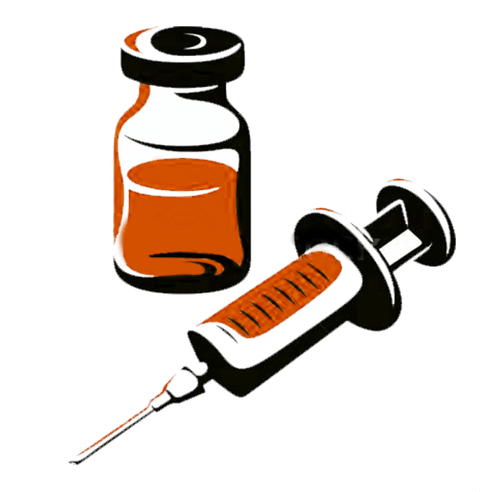


What is Semaglutide?
Semaglutide is an injectable medication which, when used in combination with diet and
exercise, helps with blood sugar control in type 2 diabetics. Semaglutide belongs to a class
of medications called glucagon-like peptide-1 (GLP-1) agonists, which mimic the hormone
GLP-1 in your body to lower blood sugar IeveIs after you've eaten a meal.
What is the hormone GLP-1?
Glucagon-like peptide 1 (GLP-1) is a hormone that causes huge effects on the regulation of
blood sugar by stimulating glucose-dependent insulin secretion. Insulin is a hormone that
promotes sugar uptake by the cells, stores sugar as glycogen, promotes the building of fat, and
signals the body to build skeletal muscle.In addition, GLP-1 inhibits glucagon release (which
slows down the release of sugar into the blood so that you burn more fat), slows down gastric
emptying (makes you feel full), and lowers the desire for food intake (because you feel full).
How does Semaglutide work for weight loss?
GLP-1 agonists like Semaglutide help to control your blood sugar, but people taking them
also tend to lose weight. GLP-1, the key hormone involved, slows down how fast your
stomach empties food (called gastric emptying). And in addition to causing your pancreas to
release insulin, Semaglutide also blocks a hormone that causes your liver to release sugar
(glucagon). Together, these functions can help you feel less hungry, causing you to eat less
food and lose more weight.
Does Semaglutide curb your appetite?
Yes, itʼs believed that Semaglutide helps curb your appetite. In addition to slowing gastric
emptying to make you feel full longer. GLP-1 also plays a direct role in how appetite is regulated.
Is Semaglutide covered by my insurance?
No. Semaglutide is not covered by insurance for people who are not diabetic type-2. However,
you can get this medication prescribed as part of this Semaglutide Weight Loss Program.
Is Semaglutide approved by the FDA?
Yes.
What are the known side effects of Semaglutide?
The common side effects of Semaglutide are:
• Nausea
• Vomiting
• Diarrhea
• Stomach pain
• Constipation
Effects like nausea and diarrhea being the most common.
Are there any significant health risks associated with using Semaglutide?
Yes. Semaglutide may cause rare side effects, including:
-
Prolonged vomiting. Patients on Semaglutide can develop gastroparesis where the
stomach stops moving, and patients vomit considerably. This can lead to
dehydration and electrolyte imbalances. Stop using Semaglutide and call your
healthcare provider right away if you have vomiting that persists more than a day. -
Inflammation of your pancreas (pancreatitis). Stop using Semaglutide and call your
healthcare provider right away if you have severe pain in your stomach area
(abdomen) that will not go away, with or without vomiting. You may feel the pain
from your abdomen to your back. -
Changes in vision. Tell your healthcare provider if you have changes in vision during
treatment with Semaglutide -
Low blood sugar (hypoglycemia). Your risk for getting low blood sugar may be higher ifyou use Semaglutide with another medicine that can cause low blood sugar, such as a
sulfonylurea or insulin. Signs and symptoms of low blood sugar may include: dizziness
or lightheadedness, blurred vision, anxiety, irritability or mood changes, sweating,
slurred speech, hunger, confusion or drowsiness, shakiness, weakness, headache, fast
heartbeat, and feeling jittery. -
Kidney problems (kidney failure). In people who have kidney problems, diarrhea,
nausea, and vomiting may cause a loss of fluids (dehydration), which may cause
kidney problems to get worse. It is important for you to drink fluids to help reduce your
chance of dehydration. -
Serious allergic reactions. Stop using Semaglutide and get medical help right away
if you have any symptoms of a serious allergic reaction, including swelling of your
face, lips, tongue, or throat; problems breathing or swallowing; severe rash or
itching; fainting or feeling dizzy; or very rapid heartbeat.
For more information on the WellSpring Restorative Health Semaglutide Program Contact:
Dr. Nael Dagstani, NMD
Phone: 480.861.3916
drdagstani@gmail.com











